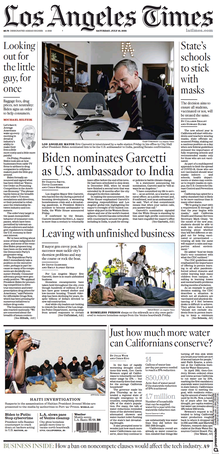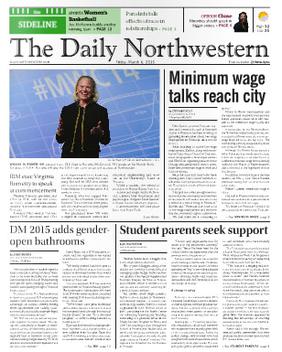Related Research Articles

The Chicago Tribune is a daily newspaper based in Chicago, Illinois, United States, owned by Tribune Publishing. Founded in 1847, and formerly self-styled as the "World's Greatest Newspaper", it remains the most-read daily newspaper in the Chicago metropolitan area and the Great Lakes region. In 2017, it had the sixth-highest circulation of any American newspaper.

The Chicago Sun-Times is a daily newspaper published in Chicago, Illinois, United States. Since 2022, it is the flagship paper of Chicago Public Media, and has the second largest circulation among Chicago newspapers, after the Chicago Tribune. The modern paper grew out of the 1948 merger of the Chicago Sun and the Chicago Daily Times. Journalists at the paper have received eight Pulitzer prizes, mostly in the 1970s; one recipient was film critic Roger Ebert (1975), who worked at the paper from 1967 until his death in 2013. Long owned by the Marshall Field family, since the 1980s ownership of the paper has changed hands numerous times, including twice in the late 2010s.

The Los Angeles Times is a daily newspaper that started publishing in Los Angeles in 1881. Based in the LA-adjacent suburb of El Segundo since 2018, it is the sixth-largest newspaper by circulation in the United States. The publication has won more than 40 Pulitzer Prizes. It is owned by Patrick Soon-Shiong and published by the Times Mirror Company. The newspaper’s coverage emphasizes California and especially Southern California stories.

The Medill School of Journalism, Media, Integrated Marketing Communications is a constituent school of Northwestern University that offers both undergraduate and graduate programs. It frequently ranks as the top school of journalism in the United States. Medill alumni include 40 Pulitzer Prize laureates, numerous national correspondents for major networks, many well-known reporters, columnists and media executives.

The Pulitzer Prize for Editorial Writing is one of the fourteen American Pulitzer Prizes that are annually awarded for Journalism. It has been awarded since 1917 for distinguished editorial writing, the test of excellence being clearness of style, moral purpose, sound reasoning, and power to influence public opinion in what the writer conceives to be the right direction. Thus it is one of the original Pulitzers, for the program was inaugurated in 1917 with seven prizes, four of which were awarded that year. The program has also recognized opinion journalism with its Pulitzer Prize for Editorial Cartooning from 1922.
The Sun Sentinel is the main daily newspaper of Fort Lauderdale, Florida, and Broward County, and covers Miami-Dade and Palm Beach counties and state-wide news, as well. It is the 4th largest-circulation newspaper in Florida. Paul Pham has held the position of general manager since November 2020, and Julie Anderson has held the position of editor-in-chief since February 2018.
The Daily Southtown is a newspaper of the Chicago, Illinois, United States metropolitan area that covers the south suburbs and the South Side neighborhoods of the city – a wide region known as the Chicago Southland. Its popular slogan is "People Up North Just Don't Get It". It is published by the Chicago Tribune Media Group.
Jack William Fuller was an American journalist who spent nearly forty years working in newspapers and was the author of seven novels and two books on journalism.

The Virginian-Pilot is the daily newspaper for Norfolk, Virginia. Commonly known as The Pilot, it is Virginia's largest daily. It serves the five cities of South Hampton Roads as well as several smaller towns across southeast Virginia and northeast North Carolina. It was a locally owned, family enterprise from its founding in 1865 at the close of the American Civil War until its sale to Tribune Publishing in 2018.

The Daily Northwestern is the student newspaper at Northwestern University which is published in print on Mondays and Thursdays and online daily during the academic year. Founded in 1881, and printed in Evanston, Illinois, it is staffed primarily by undergraduates, many of whom are students at Northwestern's Medill School of Journalism.
Winners of the 1989 Pulitzer Prize by Category
The Pulitzer Prizes for 1975, the 59th annual prizes, were ratified by the Pulitzer Prize advisory board on April 11, 1975, and by the trustees of Columbia University on May 5. For the first time, the role of accepting or rejecting recommendations of the advisory board was delegated by the trustees to the university's president, William J. McGill; the change was prompted by the desire of the trustees to distance themselves from the appearance of approval of controversial awards based on work involving what some considered to be illegal leaks, such as the 1972 Pulitzer Prize awarded for the publication of the Pentagon Papers.
Nan C. Robertson was an American journalist, author and instructor in journalism. Her awards included a Pulitzer Prize for Feature Writing.

Isabel Wilkerson is an American journalist and the author of The Warmth of Other Suns: The Epic Story of America's Great Migration (2010) and Caste: The Origins of Our Discontents (2020). She is the first woman of African-American heritage to win the Pulitzer Prize in journalism.

Chuck Neubauer is an American investigative reporter and journalist. He has written for Chicago newspapers including Chicago Today, the Chicago Tribune, the Chicago Sun-Times, and other news organizations including the Los Angeles Times and The Washington Times.

The 2011 Pulitzer Prizes were announced on Monday, April 18, 2011. The Los Angeles Times won two prizes, including the highest honor for Public Service. The New York Times also won two awards. No prize was handed out in the Breaking News category. The Wall Street Journal won an award for the first time since 2007. Jennifer Egan's A Visit From the Goon Squad picked up the Fiction prize after already winning the 2010 National Book Critics Circle Award. Photographer Carol Guzy of The Washington Post became the first journalist to win four Pulitzer Prizes.
Cheryl L. Reed is an American author and journalist. She won the 1996 Harvard Goldsmith Prize for Investigative Reporting while at the Dayton Daily News. She is the author of Poison Girls, and Unveiled: The Hidden Lives of Nuns, a work of literary journalism.
R. Bruce Dold is a Pulitzer Prize winning journalist and is the publisher and editor-in-chief of the Chicago Tribune.
Patricia Callahan is a Pulitzer Prize-winning American investigative journalist for ProPublica.
Beverly Weintraub is an American journalist. She shared the 2007 Pulitzer Prize for Editorial Writing with Arthur Browne and Heidi Evans of The New York Daily News for their editorials on Ground Zero workers’ health problems.
References
- ↑ Seeyle, Katharine Q. (July 26, 2019). "Lois Wille, Pulitzer-Winner in Her Beloved Chicago, Dies at 87". The New York Times . Retrieved July 26, 2019.
- 1 2 Kogan, Rick (July 23, 2019). "Lois Wille, trailblazing Chicago reporter and editorial writer, winner of two Pulitzers, dies at 87". Chicago Tribune. Retrieved July 23, 2019.
- 1 2 3 4 5 "A reporter breaks the silence on birth control". www.pulitzer.org. Retrieved 2019-02-12.
- ↑ "The 1989 Pulitzer Prize Winner in Editorial Writing: Lois Wille of Chicago Tribune". www.pulitzer.org. Retrieved 2019-02-12.
- 1 2 3 4 5 6 7 8 9 10 11 12 13 14 15 Gentry, Diane (April 1, 1992). "Lois Wille: Interview #4". beta.wpcf.org. Retrieved 2019-02-12.
- ↑ "Journalists of The Clare: Residents Reflect on Careers in Journalism". The Clare. 2018-01-10. Retrieved 2019-02-12.
- ↑ "Lois Wille's Pulitzer Prizes". Chicago's Women Leaders. Retrieved 2019-02-12.
- 1 2 3 Warren, James. "WRITER, THINKER, EDITOR". chicagotribune.com. Retrieved 2019-02-12.
- 1 2 3 4 "Lois Wille Introduction". beta.wpcf.org. Retrieved 2019-02-12.
- ↑ "The 1989 Pulitzer Prize Winner in Editorial Writing: Lois Wille of Chicago Tribune". www.pulitzer.org. Retrieved 2019-02-12.
- ↑ O'Donnell, Maureen (July 23, 2019). "Lois Wille, 2-time Pulitzer winner who wrote, edited for 3 Chicago papers, has died at 87". Chicago Sun-Times. Retrieved July 23, 2019.